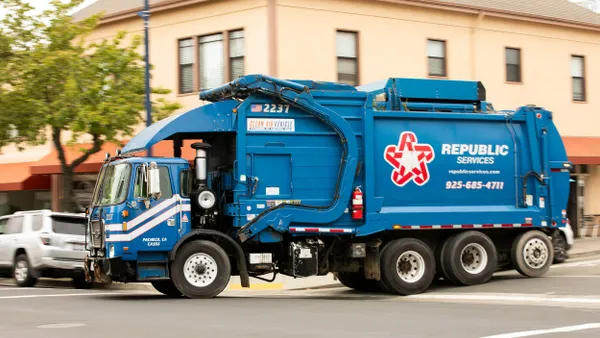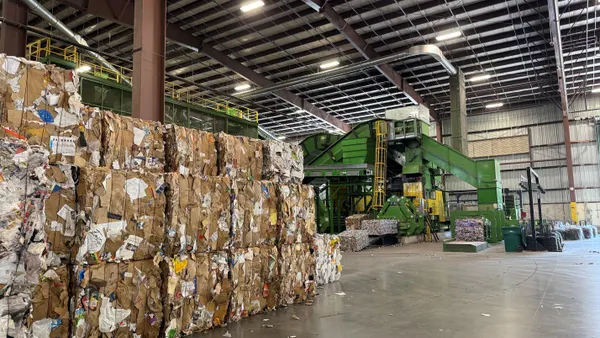Waste may be an unavoidable part of everyday life, but it rarely plays a leading role in popular culture.
While Doc Brown did power his DeLorean with household trash in the 1985 hit "Back to the Future," superhero movies aren't being made about sanitation workers and hit songs aren't being written about recycling.
Yet in recent years the waste world has begun to make a number of surprising, funny and disturbing appearances in books, movies and TV shows. Some get it more right than others, but at the very least all of them are putting the topic in the spotlight.
WALL-E (2008)
In the year 2805, Earth has been overtaken by vast mountains of garbage and humans have escaped into space for a more comfortable life. A lone robot, WALL-E, is left to clean up the planet — one compacted cube of trash at a time. After embarking on an epic adventure, WALL-E eventually helps bring humans back to repair their planet. The introduction of robots to the industry may not be that far off, as ISWA's recently-inaugurated president Antonis Mavropoulos suggested at a recent SWANA event. However the question of whether or not the planet's landfills will reach their capacity for waste before the end of the millennium remains unknown.
Great Pacific (2012-2014)
Inspired by tales of the Great Pacific Garbage Patch, this comic series took the idea a step further by imagining the patch as a floating island. A young Texan oil heir named Chas Worthington decides to settle it as a sovereign nation and chaos ensues. The comic often focuses on international politics, but the story is about the environmental effects of waste and the potential for plastic as fuel as its core. While the Pacific doesn't have a literal garbage patch, as highlighted by world leaders and organizations such as The Ocean Cleanup, the scope of this problem may be even worse than imagined.
Garbage (2013)
This lesser-known independent comedy stars two sanitation workers, Lenny and Abbott, who pick up from the rich and famous on their route in Beverly Hills, CA. "I feel like they're all my little children, dirty, and I have to clean up after them." says Lenny, looking out over a neighborhood. "If it wasn't for me, and you, they would be living in a world of filth."
The celebrities they work for every day think little of the men until Lenny finds Cuba Gooding Jr.'s Oscar in a landfill and suddenly becomes a media sensation. It seems unlikely that such a major award could end up in the garbage, but as seen by the "Treasures in the Trash" museum run by a former sanitation worker in New York, people will throw out all kinds of valuable items.
Trash (2014)
In this movie, three young Brazilian boys find a wallet in a dumpsite that provides big opportunities but puts them in conflict with a corrupt police official. While much of the movie was shot in and around the favelas of Rio de Janeiro, the dumpsite was constructed as a set for safety reasons. Some said the movie's ending was falsely optimistic compared to the tough lives of children who live and work in unregulated dumpsites around the world. At the very least, the film shows the serious waste management challenges that Rio continues to face even now that the 2016 Summer Olympic Games are over.
Star Wars: The Force Awakens (2015)
As the latest installment of the space saga nears its final act, former stormtrooper Finn leads Han Solo and Chewbacca to a tunnel that will get them into the seemingly impregnable Starkiller Base. Solo asks Finn what his job was at the base, to which he replies, "sanitation." That does not inspire confidence at first, but sure enough Finn gets the crew inside and plays a key role in saving the day. While the details of galactic waste collection may be different, this is yet another example of how sanitation workers know their routes better than anyone else and can perform under pressure.
Trashed (2015)
Cartoonist John "Derf" Backderf brings the grueling work of waste collection to life in this recent graphic novel. Inspired by Backderf's time as a sanitation worker in Richfield, OH, the book follows a trio of young men on the back of a small-town collection truck. Backderf shows the job at its best and worst in vivid detail and intersperses the stories with statistics on waste generation in the U.S. From the surprising things residents put on the curb, to the dangers of the job to the fun moments in between, "Trashed" offers one of the more realistic depictions of sanitation work outside of nonfiction.
Maya & Marty (2016)
In the finale of this NBC variety show, Maya Rudolph plays the "spirit of the land" and Martin Short plays the "spirit of the ocean" in a song about the effects of littering. The tongue-in-cheek sketch goes back and forth between which place is better for two hikers to put their trash, though neither make compelling arguments. Of course neither ocean nor land is a good place for people to leave their waste, but that doesn't stop them from doing it anyway.
Mr. Robot (2016)
In the second season episode "eps2.5_h4ndshake.sme" of USA Network's hacking drama, a financial crisis has gotten so out of hand that the sidewalks of New York are literally filling up with bags of garbage.
"Trash pile-ups have now become a real epidemic in the city," says a newscaster as one of the characters rides by piles of flaming waste in a taxi. "Due to the credit crisis ... many private businesses cannot afford waste management services, which has sparked a cottage industry of roadside garbage burning at discounted rates."
While the city would likely do everything possible to keep this scenario from becoming a reality, it's not that far-fetched. New York has seen garbage pile up in past decades due to financial issues and the streets of Paris filled up this summer due to a labor strike. Lebanon's current crisis has allowed bags of waste to accumulate in alarming proportions, highlighting why proper sanitation is a crucial public health issue.
Time Traveling Bong (2016)
In this Comedy Central stoner miniseries, cousins Jeff and Sharee end up in all kinds of dangerous time periods but none more so than the future. As a result of Citizens United, corporations have taken over the government, abolished the Environmental Protection Agency and allowed the world to devolve into a dystopian sea of open landfills. The Earth's temperature has become so hot that the two must shield themselves with old electronics to avoid burning up. As grim as this all sounds the show focuses more on laughs than horror, but its take on the potential effects of deregulation are quite relevant in light of the current presidential election.
Did we miss one of your favorite waste references in a book, movie or show? Feel free to get in touch at waste.dive.editors@industrydive.com.











